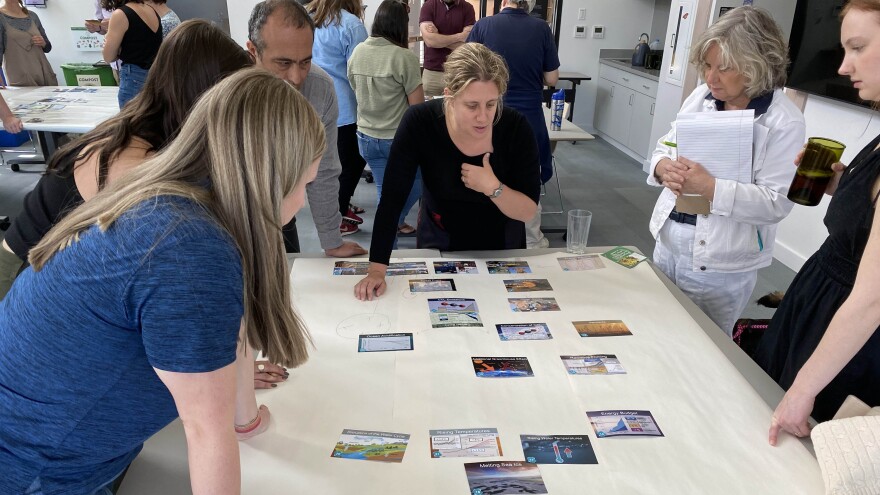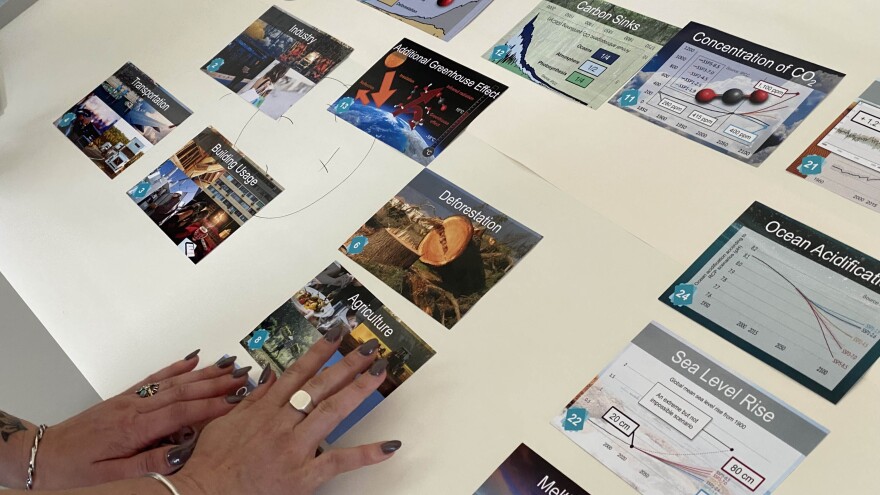What comes first: sea level rise, or melting glaciers?
Which effects of climate change stem from agricultural versus industrial activities?
Those are some of the questions a small group grappled with this week at the region’s first “Climate Fresk.”
Community members gathered at the Elizabeth River Project’s Norfolk headquarters for the three-hour event, which teaches people about the science behind climate change and how different aspects of the problem fit together.
The “fresk” name is an abbreviation of fresco, those sprawling, quickly painted works of art commonly plastered on walls throughout Europe.
The Climate Fresk allows participants, like fresco painters, to plaster a collage of cards around a wall or table. Each card represents an element of climate change.
The workshops started in France in 2018, taking advantage of gamification to break down the complex nature of climate change.
According to the Climate Fresk nonprofit, more than 1.5 million people have now participated across 157 countries and in more than four dozen different languages.
The events have even become “a trendy night out in France,” according to the New York Times.
Professor Cedric Ringenbach created them as a way to better engage students.
“I wanted them to piece together the climate change chain by themselves,” he told the Times. “It’s much more powerful from an educational point of view, because you’re not just passively listening to a lecture — you’re an actor.”
Heather Noreen, an American who moved to France three decades ago, led Norfolk’s workshop this week.
She’s in the midst of bicycling from Miami to Montreal on a “Climate Tour” that includes holding fresks.
The workshop uses information from the United Nations’ Intergovernmental Panel on Climate Change, which synthesizes international consensus on climate science.
Participants are given cards with terms ranging from simple — such as human activities and rising temperatures – to more complicated scientific concepts, including radiative forcing, permafrost impacts and ocean acidification.
They must connect the dots to show cause and effect between the elements, some of which overlap or create feedback loops.
“We were joking like, ‘Well, this could really just be a circle,’” said Colonial Place resident Rick Alexander. “One thing leads to another, and so forth.”
For instance, higher temperatures melt sea ice. But losing sea ice – which is white and reflects heat back into the atmosphere – then accelerates higher temperatures.
Noreen said the nonprofit aims to highlight solutions, on the individual, organizational and political scales.
“The whole goal is not actually that they know everything about climate change,” Noreen said of the concept. “It's that they leave the room thinking, ‘there's things I can do.’”
Composting and reducing food waste, for example, are some of the best ways for residents to lower their carbon footprint.
Noreen emphasized that the discussion around fighting climate change needs to shift from “saving the planet” to saving ourselves. It’s not Earth itself that’s in danger, but rather its habitability for humans, she noted.
To that end, the fresk’s final set of cards included the human costs of climate change, including famine, health effects and rising inequality.
Noreen said she hopes people who attend the workshops use the knowledge to take action.
“It’s part of a social momentum,” she said. “And I hope that today was a tipping point for some.”



